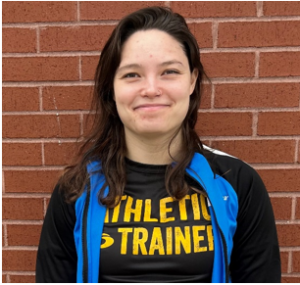
Jennifer Clune – Hampton Roads Soccer Complex Athletic Trainer
Email: jxclune@sentara.com
HRSC Athletic Training Phone: (757) 567-5483
Certified athletic trainers (ATC) are highly qualified medical professionals specializing in injury and illness prevention and are licensed healthcare providers in the state of Virginia. Athletic trainers specialize in providing primary care, evaluation and clinical diagnosis of injury and illness, injury management, therapeutic intervention, rehabilitative care, and emergency care. Furthermore, athletic trainers are available to respond within just seconds of a resulting injury and occupy a unique role in their ability to provide care to patients before, during, and after an injury occurs. Due to their unique duties and responsibilities, athletic trainers are an essential component to healthcare, and continually prove to be a valuable asset in a variety of different settings. You can find Jenni, or another athletic trainer on-site at HRSC during peak hours!
FREE Sentara Virtual Injury Consultation!
Sentara is proud to offer free virtual injury consultations and evaluations with an athletic trainer. This is available to be utilized by athletes, parents, spectators, or whomever may need an appointment. Please scan the QR code below to schedule your free consultation today!

Hampton Roads Soccer Complex Concussion Protocol
Definition: A concussion is a traumatic brain injury and is defined by the 4th International Conference on Concussion in Sports (2012) as a complex pathophysiological process affecting the brain and induced by biomechanical forces. Several common features that incorporate clinical, pathologic, and biomechanical injury constructs that may be utilized in defining the nature of a concussive head injury include the following:
● Concussion may be caused either by a direct blow to the head, face, neck, or elsewhere on the body with an “impulsive” force transmitted to the head.
● Concussion typically results in the rapid onset of short-lived impairment of neurologic function that resolves spontaneously. However, in some cases, symptoms and signs may evolve over a number of minutes, hours, or days.
● Concussion may result in neuropathological changes, but the acute clinical symptoms largely reflect a functional disturbance rather than a structural injury with no abnormality seen on standard structural neuroimaging studies.
● Concussion results in a graded set of clinical symptoms that may or may not involve loss of consciousness. Resolution of the clinical and cognitive symptoms typically follows a sequential course. It is important to note, however, that symptoms may be prolonged in some cases.
Appropriate licensed health care provider means a physician, physician assistant, osteopath physician, or athletic trainer licensed by the Virginia Board of Medicine; a neuropsychologist licensed by the Board of Psychology; or a nurse practitioner licensed by the Virginia State Board of Nursing. Cognitive rest means limiting cognitive exertion and careful management of neurometabolic demands on the brain during recovery.
Return-to-play means participating in a nonmedically supervised practice or athletic competition. Non-interscholastic youth sports program means a program organized for recreational athletic competition or recreational athletic instruction for youth.
Signs & Symptoms of a Concussion:
● Headache or “pressure” in head
● Nausea or vomiting
● Balance problems or dizziness
● Double or blurry vision
● Sensitivity to light or noise
● Feeling sluggish, hazy, foggy, or groggy
● Concentration or memory problems
● Confusion
● Just not “feeling right” or is “feeling down”
● Appears dazed or stunned
● Forgets an instruction
● Unsure of game, score, or opponent
● Moves clumsily
● Answers questions slowly
● Loss of consciousness (even briefly)
● Shows mood, behavior, or personality changes
● Changes in normal sleep patterns
RED Flags:
If your child/teenager experiences any of the following signs/symptoms, they should be seen in an
emergency department right away:
● One pupil larger than the other
● Drowsiness or cannot be awakened
● A headache that continues to worsen and does not go away
● Weakness, numbness, or decreased coordination
● Repeated vomiting or nausea
● Slurred speech
● Convulsions or seizures
● Difficulty recognizing people or places
● Increasing confusion, restlessness, or agitation
● Unusual behavior
● Loss of consciousness (even brief LOC should be taken seriously)
Protocol:
If an athlete/patient reports a Mechanism of Injury (MOI) related to a head injury AND has one or more
symptoms (listed in the checklist above), the following action must be taken:
1. The athlete/patient will be removed from activity the remainder of the day, and symptoms will
be monitored throughout the day. A SCAT5/Child SCAT5 concussion assessment will be
performed by the appropriate medical personnel (ATC) and will be sent with the patient and
parents/legal guardian.
a. If any of the red flags (listed above) are present, the athlete/patient should immediately
be taken to the Emergency Room (ER) for further evaluation
i. Transport may be by ambulance or party responsible for athlete (parent, legal
guardian, etc.) and is dependent on symptoms being displayed
b. If a cervical spine injury is suspected, ATC will manually immobilize the patient’s cervical
spine and activate EMS and will maintain immobilization until EMS crew takes over
patient care
c. All signs/symptoms of an ER referral must be clearly communicated with the patient and
the parents/legal guardian/other responsible party accompanying athlete.
2. If the athlete/patient is still reporting symptoms the following day, they must be seen and
cleared for full return to play (RTP) by a physician. VA State Law states all suspected concussions
must be cleared through a physician prior to RTP.
3. If the athlete/patient reports NO symptoms the following day (within 24 hours), athlete/patient
can be re-evaluated for RTP. If NO signs/symptoms are present the following day, after being re-
evaluated, the athlete/patient may resume activities as tolerated.
a. However, we strongly encourage all suspected concussions to follow up with their
school ATC for further evaluation, if applicable, and follow through the appropriate post
concussive care, which includes clearance from a physician to be fully cleared to RTP.
If an athlete/patient reports a Mechanism of Injury (MOI) related to a head injury but DENIES ALL
SYMPTOMS listed above the following actions must be taken:
1. A modified on-field SCAT5/Child SCAT5, cranial nerve assessment, and finger to nose (FTN)
coordination test will be performed
a. If all findings are normal, ATC will then discuss with patient and parent/legal guardian (if
under the age of 18) the risk of returning to play as concussion symptoms do not always
present immediately after MOI has occurred
i. If the risk is acknowledged by all parties involved, the athlete may return to play
ii. The patient must agree to leave the field and be re-evaluated if symptoms start
to occur after returning to the field
iii. ATC will notify patient's coach that they can return, but to watch for any
unusual behaviors for the patient, and remove them from play if those
behaviors are noticed
iv. Finally, if assessment is done during a game, ATC will let one of the
referees know that the patient has been cleared to return
b. If any findings are abnormal and cannot be explained by any other previously known
condition, then injury will be treated as a possible concussion and patient will be
removed from activity for the day and a full assessment will be done.
Protocol for Day After Concussion-Like Symptoms (Ages 13 and over)
1. Jog: 5min
2. Body Weight Squats: 10ct
3. Grapevine: 15yds, 2x
4. Burpies: 6ct
5. Crunches: 15ct
6. Push-Ups: 10ct
7. Jump Turns with Recognition: Clinician holds up numbers (fingers) on hands. Athlete identifies number when turned to face clinician
a. Total of 8x
8. Sprint/Back Pedal Exercise: 2min
a. Athlete sprints to clinician and back pedal back to starting point. On each repetition, clinician moves farther away from starting point. At the 1 min mark, clinician begins to slowly decrease distance from starting point until 2 min is reached
Protocol for Day After Concussion-Like Symptoms (Ages 12 and under)
1. Jog: 3min
2. Body Weight Squats: 10ct
3. Grapevine: 15yds, 2x
4. Burpies: 4 ct
5. Crunches: 10 ct
6. Push-Ups: 5ct
7. Jump Turns with Recognition: Clinician holds up numbers (fingers) on hands. Athlete identifies number when turned to face clinician
a. Total of 8x
8. Sprint/Back Pedal Exercise: 2min
a. Athlete sprints to clinician and back pedal back to starting point. On each repetition, clinician moves farther away from starting point. At the 1 min mark, clinician begins to slowly decrease distance from starting point until 2 min is reached
Approved by Dr. Devesh Patel on 12/15/24
References
Virginia Board of Education Guidelines for Policies on Concussions in Students.
https://www.doe.virginia.gov/boe/guidance/health/2016-guidelines-for-policies-on-concussions-in-
students.pdf. Accessed October 12, 2021.
Concussion Fact Sheet for Parents .
https://www.cdc.gov/headsup/pdfs/custom/headsupconcussion_fact_sheet_for_parents.pdf.
Accessed October 12, 2021.
Broglio SP, Cantu RC, Gioia GA, et al. National Athletic Trainers' Association position statement:
Management of Sport Concussion. Journal of Athletic Training. 2014;49(2):245-265.
doi:10.4085/1062-6050-49.1.07
Additional Links:
http://fs.ncaa.org/Docs/health_safety/ConFactSheetsa.pdf
https://www.michigan.gov/documents/mdch/Parentandathleteinfosheet_415328_7.pdf
https://www.nata.org/sites/default/files/concussion-infographic-handout.pdf
https://www.cdc.gov/heads-up/about/index.html
https://www.cdc.gov/traumatic-brain-injury/media/pdfs/2018-mtbi_recovery-508.pdf
